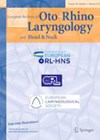
Journal Reviews
The decision-making process by parents of children with residual hearing who receive cochlear implants
It can be a difficult decision for parents whose children have residual hearing whether or not to undergo cochlear implantation. Their children may seem to be hearing with their hearing aids, and even in some cases can hear without aids....
Third-party disability in cochlear implant users
Hearing loss causes changes for those experiencing it and the people who share in their everyday lives, often referred to as third party disability or caregiver burden. This study emphasises the notion that this phenomenon can be considered a disability,...
MRI scanning patients with cochlear implants and auditory brainstem implants
In the last five to six decades, MRI scanning has gone from physics experiments in Nottingham University through to Nobel prize-winning work by Sir Peter Mansfield and Paul Lauterbur, to a ‘routine’ imaging modality with an estimated 60 million MRI...
Early vs late activation of cochlear implant device
Device activation after cochlear implant surgery was typically performed after wound healing, and varies anytime from three to four weeks after surgery. Nowadays, activation is performed as early as two to three days after surgery. The authors evaluated the effect...
Advances in auditory implants
This article provides an overview of auditory implants. Implanted auditory devices may be classified into bone conduction implants (BCI) and active middle ear implants (AMEI) that stimulate cochlear hair cells, and cochlear implants (CI) that stimulate neural structures. CIs bypass...
Preoperative unaided maximum monosyllabic word recognition score as a predictor of CI outcomes
This retrospective study supports early intervention and hearing rehabilitation with hearing amplification for adults. The authors included 103 patients (128 ears), who had undergone cochlear implantation over a seven-year period, in this study. All patients had been assessed for their...
Systematic review and meta-analysis showing benefit of cochlear implantation in adults with single-sided deafness
This article presents results of a systematic review and meta-analysis to further investigate the impact of unilateral cochlear implantation (CI) in adults with single-sided deafness (SSD) with regards to speech perception in quiet and noise, tinnitus, sound localisation and quality...
Cochlear implantation in enlarged vestibular aqueduct patients
In this systematic review, the authors describe the complications and outcomes of cochlear implantation in patients with enlarged vestibular aqueduct (EVA). The authors reviewed five major databases and included 4035 patients from 34 studies. Of these, 853 patients (21.14%) had...
Third-party disability in cochlear implantation
The authors of this study note significant third-party disability experienced by significant others (SO) or communication partners of persons with hearing impairment (PHI). The study explored contextual and psychosocial factors for successful auditory rehabilitation, advocating for the importance of including...
Music training for cochlear implant users
The ability to enjoy music is something that is important to most people and contributes to wellbeing, as well as holding cultural significance. However, the speech signal is generally prioritised for those with cochlear implants (and indeed hearing aids). Improving...
Electrocochleography and cochlear implants programming
Cochlear implants (CIs) often are the only option for people with severe to profound sensorineural hearing loss to be able to hear. Therefore, effective CI programming seems very important, especially in children who are still developing their speech. Using acoustic...
How to manage the cheek in gender affirming surgery
This publication discusses cheek augmentation surgery related to gender-affirming facial surgery. The publication describes the difference between the common male cheek anatomy and the desired ideal feminine appearance and how to achieve it. In the author’s experience, gender-affirming surgery patients...
















